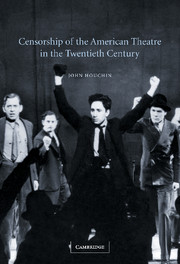Book contents
- Frontmatter
- Contents
- Acknowledgments
- Introduction
- 1 Overture: theatrical censorship from the Puritans to Anthony Comstock
- 2 Bad girls, tough guys, and the changing of the guard
- 3 Flappers and fanatics
- 4 Have you now or have you ever …
- 5 Bye, bye American pie
- 6 The past is prologue
- Notes
- Bibliography
- Index
4 - Have you now or have you ever …
Published online by Cambridge University Press: 22 September 2009
- Frontmatter
- Contents
- Acknowledgments
- Introduction
- 1 Overture: theatrical censorship from the Puritans to Anthony Comstock
- 2 Bad girls, tough guys, and the changing of the guard
- 3 Flappers and fanatics
- 4 Have you now or have you ever …
- 5 Bye, bye American pie
- 6 The past is prologue
- Notes
- Bibliography
- Index
Summary
Professional theatre in the Depression
Upon accepting the Republican nomination for president in 1928, Herbert Hoover announced that the United States was “nearer to the final triumph over poverty than ever before in the history of any land.” Apparently the American electorate agreed, for Hoover solidly defeated the Democratic candidate, New York Governor Al Smith. As the 1920s drew to an end, it seemed that big business had solved America's social problems. The booming consumer economy allowed corporate leaders to proclaim the triumph of industrial capitalism. On the surface, their claims were justified. Living standards had risen at home, and America's diplomatic and military conquests had secured numerous international investment opportunities as well as the acquisition of cheap raw materials. The “labor problem” also seemed to have been resolved. Militant labor activists had been driven underground by the post-World War I “Red scare” and the welfare policies of many large businesses softened the animosity that characterized earlier interactions between labor and management.
But all was not as it seemed. Beneath the veneer of prosperity, American society was riven by economic and social conflicts. Hoover knew that the economy was in trouble, but did nothing for fear of dampening the enthusiasm necessary to maintain the speculative boom of the era. By 1928, the rapid industrial expansion that had fueled the optimism of the previous years was waning. Construction slowed, consumers reduced their spending, and manufacturers' inventories began to swell. In 1929, industrial corporations reduced production and began to lay off workers.
- Type
- Chapter
- Information
- Censorship of the American Theatre in the Twentieth Century , pp. 117 - 172Publisher: Cambridge University PressPrint publication year: 2003

